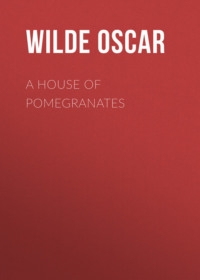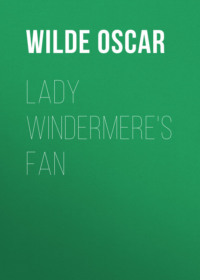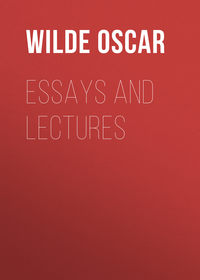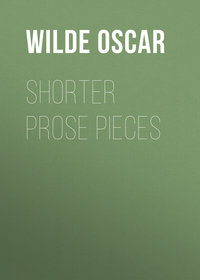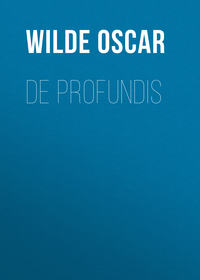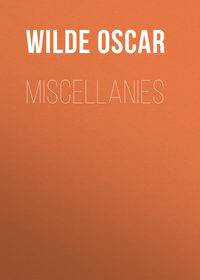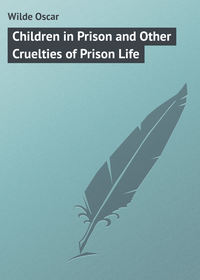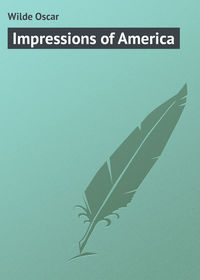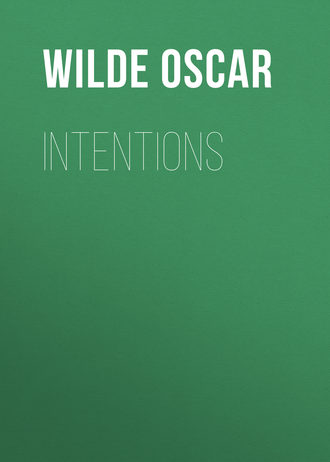 полная версия
полная версияIntentions
Cyril. I think that view might be questioned. I am rather inclined to believe in ‘the impulse from a vernal wood,’ though of course the artistic value of such an impulse depends entirely on the kind of temperament that receives it, so that the return to Nature would come to mean simply the advance to a great personality. You would agree with that, I fancy. However, proceed with your article.
Vivian (reading). ‘Art begins with abstract decoration, with purely imaginative and pleasurable work dealing with what is unreal and non-existent. This is the first stage. Then Life becomes fascinated with this new wonder, and asks to be admitted into the charmed circle. Art takes life as part of her rough material, recreates it, and refashions it in fresh forms, is absolutely indifferent to fact, invents, imagines, dreams, and keeps between herself and reality the impenetrable barrier of beautiful style, of decorative or ideal treatment. The third stage is when Life gets the upper hand, and drives Art out into the wilderness. That is the true decadence, and it is from this that we are now suffering.
‘Take the case of the English drama. At first in the hands of the monks Dramatic Art was abstract, decorative and mythological. Then she enlisted Life in her service, and using some of life’s external forms, she created an entirely new race of beings, whose sorrows were more terrible than any sorrow man has ever felt, whose joys were keener than lover’s joys, who had the rage of the Titans and the calm of the gods, who had monstrous and marvellous sins, monstrous and marvellous virtues. To them she gave a language different from that of actual use, a language full of resonant music and sweet rhythm, made stately by solemn cadence, or made delicate by fanciful rhyme, jewelled with wonderful words, and enriched with lofty diction. She clothed her children in strange raiment and gave them masks, and at her bidding the antique world rose from its marble tomb. A new Cæsar stalked through the streets of risen Rome, and with purple sail and flute-led oars another Cleopatra passed up the river to Antioch. Old myth and legend and dream took shape and substance. History was entirely re-written, and there was hardly one of the dramatists who did not recognise that the object of Art is not simple truth but complex beauty. In this they were perfectly right. Art itself is really a form of exaggeration; and selection, which is the very spirit of art, is nothing more than an intensified mode of over-emphasis.
‘But Life soon shattered the perfection of the form. Even in Shakespeare we can see the beginning of the end. It shows itself by the gradual breaking-up of the blank-verse in the later plays, by the predominance given to prose, and by the over-importance assigned to characterisation. The passages in Shakespeare – and they are many – where the language is uncouth, vulgar, exaggerated, fantastic, obscene even, are entirely due to Life calling for an echo of her own voice, and rejecting the intervention of beautiful style, through which alone should life be suffered to find expression. Shakespeare is not by any means a flawless artist. He is too fond of going directly to life, and borrowing life’s natural utterance. He forgets that when Art surrenders her imaginative medium she surrenders everything. Goethe says, somewhere —
In der Beschränkung zeigt Fsich erst der Meister,
“It is in working within limits that the master reveals himself,” and the limitation, the very condition of any art is style. However, we need not linger any longer over Shakespeare’s realism. The Tempest is the most perfect of palinodes. All that we desired to point out was, that the magnificent work of the Elizabethan and Jacobean artists contained within itself the seeds of its own dissolution, and that, if it drew some of its strength from using life as rough material, it drew all its weakness from using life as an artistic method. As the inevitable result of this substitution of an imitative for a creative medium, this surrender of an imaginative form, we have the modern English melodrama. The characters in these plays talk on the stage exactly as they would talk off it; they have neither aspirations nor aspirates; they are taken directly from life and reproduce its vulgarity down to the smallest detail; they present the gait, manner, costume and accent of real people; they would pass unnoticed in a third-class railway carriage. And yet how wearisome the plays are! They do not succeed in producing even that impression of reality at which they aim, and which is their only reason for existing. As a method, realism is a complete failure.
‘What is true about the drama and the novel is no less true about those arts that we call the decorative arts. The whole history of these arts in Europe is the record of the struggle between Orientalism, with its frank rejection of imitation, its love of artistic convention, its dislike to the actual representation of any object in Nature, and our own imitative spirit. Wherever the former has been paramount, as in Byzantium, Sicily and Spain, by actual contact, or in the rest of Europe by the influence of the Crusades, we have had beautiful and imaginative work in which the visible things of life are transmuted into artistic conventions, and the things that Life has not are invented and fashioned for her delight. But wherever we have returned to Life and Nature, our work has always become vulgar, common and uninteresting. Modern tapestry, with its aërial effects, its elaborate perspective, its broad expanses of waste sky, its faithful and laborious realism, has no beauty whatsoever. The pictorial glass of Germany is absolutely detestable. We are beginning to weave possible carpets in England, but only because we have returned to the method and spirit of the East. Our rugs and carpets of twenty years ago, with their solemn depressing truths, their inane worship of Nature, their sordid reproductions of visible objects, have become, even to the Philistine, a source of laughter. A cultured Mahomedan once remarked to us, “You Christians are so occupied in misinterpreting the fourth commandment that you have never thought of making an artistic application of the second.” He was perfectly right, and the whole truth of the matter is this: The proper school to learn art in is not Life but Art.’
And now let me read you a passage which seems to me to settle the question very completely.
‘It was not always thus. We need not say anything about the poets, for they, with the unfortunate exception of Mr. Wordsworth, have been really faithful to their high mission, and are universally recognised as being absolutely unreliable. But in the works of Herodotus, who, in spite of the shallow and ungenerous attempts of modern sciolists to verify his history, may justly be called the “Father of Lies”; in the published speeches of Cicero and the biographies of Suetonius; in Tacitus at his best; in Pliny’s Natural History; in Hanno’s Periplus; in all the early chronicles; in the Lives of the Saints; in Froissart and Sir Thomas Malory; in the travels of Marco Polo; in Olaus Magnus, and Aldrovandus, and Conrad Lycosthenes, with his magnificent Prodigiorum et Ostentorum Chronicon; in the autobiography of Benvenuto Cellini; in the memoirs of Casanova; in Defoe’s History of the Plague; in Boswell’s Life of Johnson; in Napoleon’s despatches, and in the works of our own Carlyle, whose French Revolution is one of the most fascinating historical novels ever written, facts are either kept in their proper subordinate position, or else entirely excluded on the general ground of dulness. Now, everything is changed. Facts are not merely finding a footing-place in history, but they are usurping the domain of Fancy, and have invaded the kingdom of Romance. Their chilling touch is over everything. They are vulgarising mankind. The crude commercialism of America, its materialising spirit, its indifference to the poetical side of things, and its lack of imagination and of high unattainable ideals, are entirely due to that country having adopted for its national hero a man who, according to his own confession, was incapable of telling a lie, and it is not too much to say that the story of George Washington and the cherry-tree has done more harm, and in a shorter space of time, than any other moral tale in the whole of literature.’
Cyril. My dear boy!
Vivian. I assure you it is the case, and the amusing part of the whole thing is that the story of the cherry-tree is an absolute myth. However, you must not think that I am too despondent about the artistic future either of America or of our own country. Listen to this: —
‘That some change will take place before this century has drawn to its close we have no doubt whatsoever. Bored by the tedious and improving conversation of those who have neither the wit to exaggerate nor the genius to romance, tired of the intelligent person whose reminiscences are always based upon memory, whose statements are invariably limited by probability, and who is at any time liable to be corroborated by the merest Philistine who happens to be present, Society sooner or later must return to its lost leader, the cultured and fascinating liar. Who he was who first, without ever having gone out to the rude chase, told the wandering cavemen at sunset how he had dragged the Megatherium from the purple darkness of its jasper cave, or slain the Mammoth in single combat and brought back its gilded tusks, we cannot tell, and not one of our modern anthropologists, for all their much-boasted science, has had the ordinary courage to tell us. Whatever was his name or race, he certainly was the true founder of social intercourse. For the aim of the liar is simply to charm, to delight, to give pleasure. He is the very basis of civilised society, and without him a dinner-party, even at the mansions of the great, is as dull as a lecture at the Royal Society, or a debate at the Incorporated Authors, or one of Mr. Burnand’s farcical comedies.
‘Nor will he be welcomed by society alone. Art, breaking from the prison-house of realism, will run to greet him, and will kiss his false, beautiful lips, knowing that he alone is in possession of the great secret of all her manifestations, the secret that Truth is entirely and absolutely a matter of style; while Life – poor, probable, uninteresting human life – tired of repeating herself for the benefit of Mr. Herbert Spencer, scientific historians, and the compilers of statistics in general, will follow meekly after him, and try to reproduce, in her own simple and untutored way, some of the marvels of which he talks.
‘No doubt there will always be critics who, like a certain writer in the Saturday Review, will gravely censure the teller of fairy tales for his defective knowledge of natural history, who will measure imaginative work by their own lack of any imaginative faculty, and will hold up their ink-stained hands in horror if some honest gentleman, who has never been farther than the yew-trees of his own garden, pens a fascinating book of travels like Sir John Mandeville, or, like great Raleigh, writes a whole history of the world, without knowing anything whatsoever about the past. To excuse themselves they will try and shelter under the shield of him who made Prospero the magician, and gave him Caliban and Ariel as his servants, who heard the Tritons blowing their horns round the coral reefs of the Enchanted Isle, and the fairies singing to each other in a wood near Athens, who led the phantom kings in dim procession across the misty Scottish heath, and hid Hecate in a cave with the weird sisters. They will call upon Shakespeare – they always do – and will quote that hackneyed passage forgetting that this unfortunate aphorism about Art holding the mirror up to Nature, is deliberately said by Hamlet in order to convince the bystanders of his absolute insanity in all art-matters.’
Cyril. Ahem! Another cigarette, please.
Vivian. My dear fellow, whatever you may say, it is merely a dramatic utterance, and no more represents Shakespeare’s real views upon art than the speeches of Iago represent his real views upon morals. But let me get to the end of the passage:
‘Art finds her own perfection within, and not outside of, herself. She is not to be judged by any external standard of resemblance. She is a veil, rather than a mirror. She has flowers that no forests know of, birds that no woodland possesses. She makes and unmakes many worlds, and can draw the moon from heaven with a scarlet thread. Hers are the “forms more real than living man,” and hers the great archetypes of which things that have existence are but unfinished copies. Nature has, in her eyes, no laws, no uniformity. She can work miracles at her will, and when she calls monsters from the deep they come. She can bid the almond-tree blossom in winter, and send the snow upon the ripe cornfield. At her word the frost lays its silver finger on the burning mouth of June, and the winged lions creep out from the hollows of the Lydian hills. The dryads peer from the thicket as she passes by, and the brown fauns smile strangely at her when she comes near them. She has hawk-faced gods that worship her, and the centaurs gallop at her side.’
Cyril. I like that. I can see it. Is that the end?
Vivian. No. There is one more passage, but it is purely practical. It simply suggests some methods by which we could revive this lost art of Lying.
Cyril. Well, before you read it to me, I should like to ask you a question. What do you mean by saying that life, ‘poor, probable, uninteresting human life,’ will try to reproduce the marvels of art? I can quite understand your objection to art being treated as a mirror. You think it would reduce genius to the position of a cracked looking-glass. But you don’t mean to say that you seriously believe that Life imitates Art, that Life in fact is the mirror, and Art the reality?
Vivian. Certainly I do. Paradox though it may seem – and paradoxes are always dangerous things – it is none the less true that Life imitates art far more than Art imitates life. We have all seen in our own day in England how a certain curious and fascinating type of beauty, invented and emphasised by two imaginative painters, has so influenced Life that whenever one goes to a private view or to an artistic salon one sees, here the mystic eyes of Rossetti’s dream, the long ivory throat, the strange square-cut jaw, the loosened shadowy hair that he so ardently loved, there the sweet maidenhood of ‘The Golden Stair,’ the blossom-like mouth and weary loveliness of the ‘Laus Amoris,’ the passion-pale face of Andromeda, the thin hands and lithe beauty of the Vivian in ‘Merlin’s Dream.’ And it has always been so. A great artist invents a type, and Life tries to copy it, to reproduce it in a popular form, like an enterprising publisher. Neither Holbein nor Vandyck found in England what they have given us. They brought their types with them, and Life with her keen imitative faculty set herself to supply the master with models. The Greeks, with their quick artistic instinct, understood this, and set in the bride’s chamber the statue of Hermes or of Apollo, that she might bear children as lovely as the works of art that she looked at in her rapture or her pain. They knew that Life gains from art not merely spirituality, depth of thought and feeling, soul-turmoil or soul-peace, but that she can form herself on the very lines and colours of art, and can reproduce the dignity of Pheidias as well as the grace of Praxiteles. Hence came their objection to realism. They disliked it on purely social grounds. They felt that it inevitably makes people ugly, and they were perfectly right. We try to improve the conditions of the race by means of good air, free sunlight, wholesome water, and hideous bare buildings for the better housing of the lower orders. But these things merely produce health, they do not produce beauty. For this, Art is required, and the true disciples of the great artist are not his studio-imitators, but those who become like his works of art, be they plastic as in Greek days, or pictorial as in modern times; in a word, Life is Art’s best, Art’s only pupil.
As it is with the visible arts, so it is with literature. The most obvious and the vulgarest form in which this is shown is in the case of the silly boys who, after reading the adventures of Jack Sheppard or Dick Turpin, pillage the stalls of unfortunate apple-women, break into sweet-shops at night, and alarm old gentlemen who are returning home from the city by leaping out on them in suburban lanes, with black masks and unloaded revolvers. This interesting phenomenon, which always occurs after the appearance of a new edition of either of the books I have alluded to, is usually attributed to the influence of literature on the imagination. But this is a mistake. The imagination is essentially creative, and always seeks for a new form. The boy-burglar is simply the inevitable result of life’s imitative instinct. He is Fact, occupied as Fact usually is, with trying to reproduce Fiction, and what we see in him is repeated on an extended scale throughout the whole of life. Schopenhauer has analysed the pessimism that characterises modern thought, but Hamlet invented it. The world has become sad because a puppet was once melancholy. The Nihilist, that strange martyr who has no faith, who goes to the stake without enthusiasm, and dies for what he does not believe in, is a purely literary product. He was invented by Tourgénieff, and completed by Dostoieffski. Robespierre came out of the pages of Rousseau as surely as the People’s Palace rose out of the débris of a novel. Literature always anticipates life. It does not copy it, but moulds it to its purpose. The nineteenth century, as we know it, is largely an invention of Balzac. Our Luciens de Rubempré, our Rastignacs, and De Marsays made their first appearance on the stage of the Comédie Humaine. We are merely carrying out, with footnotes and unnecessary additions, the whim or fancy or creative vision of a great novelist. I once asked a lady, who knew Thackeray intimately, whether he had had any model for Becky Sharp. She told me that Becky was an invention, but that the idea of the character had been partly suggested by a governess who lived in the neighbourhood of Kensington Square, and was the companion of a very selfish and rich old woman. I inquired what became of the governess, and she replied that, oddly enough, some years after the appearance of Vanity Fair, she ran away with the nephew of the lady with whom she was living, and for a short time made a great splash in society, quite in Mrs. Rawdon Crawley’s style, and entirely by Mrs. Rawdon Crawley’s methods. Ultimately she came to grief, disappeared to the Continent, and used to be occasionally seen at Monte Carlo and other gambling places. The noble gentleman from whom the same great sentimentalist drew Colonel Newcome died, a few months after The Newcomer had reached a fourth edition, with the word ‘Adsum’ on his lips. Shortly after Mr. Stevenson published his curious psychological story of transformation, a friend of mine, called Mr. Hyde, was in the north of London, and being anxious to get to a railway station, took what he thought would be a short cut, lost his way, and found himself in a network of mean, evil-looking streets. Feeling rather nervous he began to walk extremely fast, when suddenly out of an archway ran a child right between his legs. It fell on the pavement, he tripped over it, and trampled upon it. Being of course very much frightened and a little hurt, it began to scream, and in a few seconds the whole street was full of rough people who came pouring out of the houses like ants. They surrounded him, and asked him his name. He was just about to give it when he suddenly remembered the opening incident in Mr. Stevenson’s story. He was so filled with horror at having realised in his own person that terrible and well-written scene, and at having done accidentally, though in fact, what the Mr. Hyde of fiction had done with deliberate intent, that he ran away as hard as he could go. He was, however, very closely followed, and finally he took refuge in a surgery, the door of which happened to be open, where he explained to a young assistant, who happened to be there, exactly what had occurred. The humanitarian crowd were induced to go away on his giving them a small sum of money, and as soon as the coast was clear he left. As he passed out, the name on the brass door-plate of the surgery caught his eye. It was ‘Jekyll.’ At least it should have been.
Here the imitation, as far as it went, was of course accidental. In the following case the imitation was self-conscious. In the year 1879, just after I had left Oxford, I met at a reception at the house of one of the Foreign Ministers a woman of very curious exotic beauty. We became great friends, and were constantly together. And yet what interested me most in her was not her beauty, but her character, her entire vagueness of character. She seemed to have no personality at all, but simply the possibility of many types. Sometimes she would give herself up entirely to art, turn her drawing-room into a studio, and spend two or three days a week at picture galleries or museums. Then she would take to attending race-meetings, wear the most horsey clothes, and talk about nothing but betting. She abandoned religion for mesmerism, mesmerism for politics, and politics for the melodramatic excitements of philanthropy. In fact, she was a kind of Proteus, and as much a failure in all her transformations as was that wondrous sea-god when Odysseus laid hold of him. One day a serial began in one of the French magazines. At that time I used to read serial stories, and I well remember the shock of surprise I felt when I came to the description of the heroine. She was so like my friend that I brought her the magazine, and she recognised herself in it immediately, and seemed fascinated by the resemblance. I should tell you, by the way, that the story was translated from some dead Russian writer, so that the author had not taken his type from my friend. Well, to put the matter briefly, some months afterwards I was in Venice, and finding the magazine in the reading-room of the hotel, I took it up casually to see what had become of the heroine. It was a most piteous tale, as the girl had ended by running away with a man absolutely inferior to her, not merely in social station, but in character and intellect also. I wrote to my friend that evening about my views on John Bellini, and the admirable ices at Florian’s, and the artistic value of gondolas, but added a postscript to the effect that her double in the story had behaved in a very silly manner. I don’t know why I added that, but I remember I had a sort of dread over me that she might do the same thing. Before my letter had reached her, she had run away with a man who deserted her in six months. I saw her in 1884 in Paris, where she was living with her mother, and I asked her whether the story had had anything to do with her action. She told me that she had felt an absolutely irresistible impulse to follow the heroine step by step in her strange and fatal progress, and that it was with a feeling of real terror that she had looked forward to the last few chapters of the story. When they appeared, it seemed to her that she was compelled to reproduce them in life, and she did so. It was a most clear example of this imitative instinct of which I was speaking, and an extremely tragic one.
However, I do not wish to dwell any further upon individual instances. Personal experience is a most vicious and limited circle. All that I desire to point out is the general principle that Life imitates Art far more than Art imitates Life, and I feel sure that if you think seriously about it you will find that it is true. Life holds the mirror up to Art, and either reproduces some strange type imagined by painter or sculptor, or realises in fact what has been dreamed in fiction. Scientifically speaking, the basis of life – the energy of life, as Aristotle would call it – is simply the desire for expression, and Art is always presenting various forms through which this expression can be attained. Life seizes on them and uses them, even if they be to her own hurt. Young men have committed suicide because Rolla did so, have died by their own hand because by his own hand Werther died. Think of what we owe to the imitation of Christ, of what we owe to the imitation of Cæsar.


